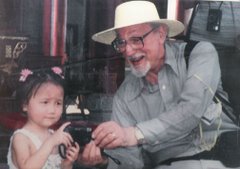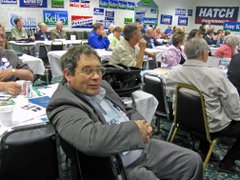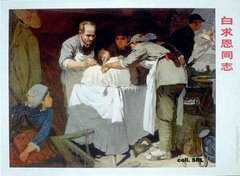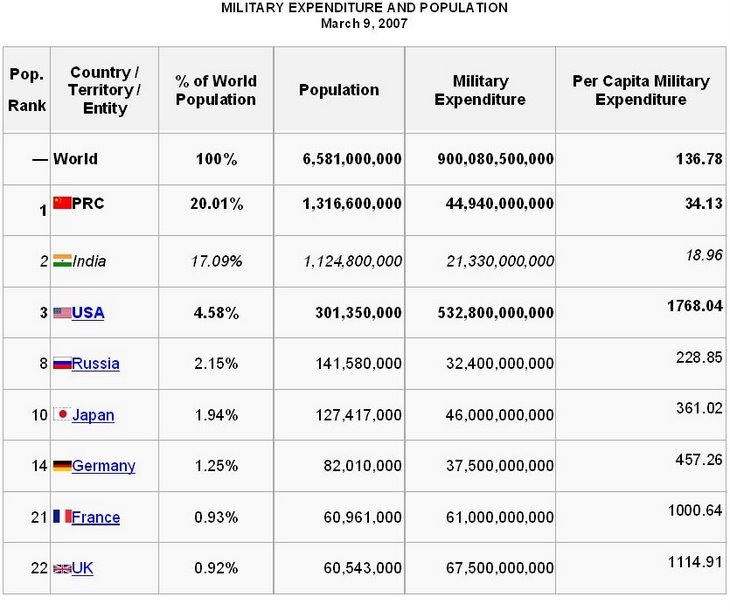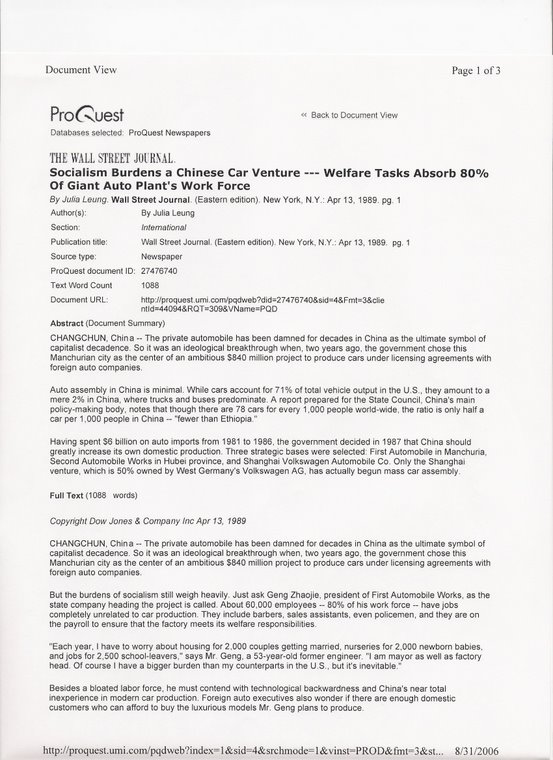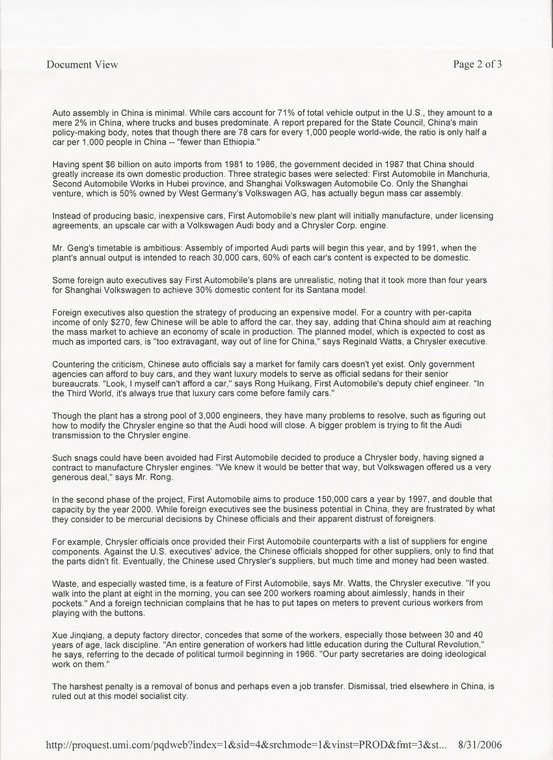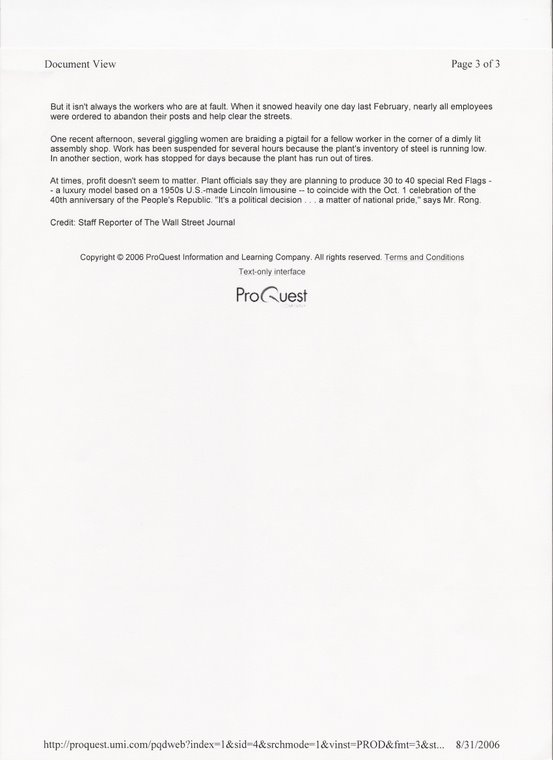From that point on, it would appear that the European countries are angling to name the next head of the World Bank, a position which has been monopolized by the USA. Then it would appear that the European countries pressured the USA to make some compromise to effect a resignation and it looked as though that might happen until Condoleezza Rice, in a more sober and non-pernicious statement, questioned the reason members of the World Bank Board are so intent on Wolfowitz’s ouster. (Reference the attached New York Times article by Steven R. Weisman titled, “Some Leeway for Wolfowitz, Who Gets a Good Word from Rice” published online on May 10, 2007).
In truth, the real argument underneath all of this power play is Mr.Wolfowitz’s actions since 2005 in which he found reason to praise China as being the most effective in eliminating poverty. In this atmosphere, one recalls an incident during President Bush’s Latin American tour about a particular moment when Bush spoke in Columbia and Chavez, simultaneously, in Uruguay. Chavez asked Bush, “Why can’t you mention my name?” He goes on to ask, “Since you’ve been President for seven years, did you just learn of poverty in Latin America?”
The records show a progression of public statements by Mr. Wolfowitz highly praising the Chinese for their real accomplishments in poverty reduction. He was negotiating with the Chinese to establish a system of loans to help the strengthening of China’s economically backward west.
We list quotations from his public statements beginning in April 1, 2005 and continuing through October 14, 2005:
“The goal of poverty reduction is as valid in China as it is elsewhere . . . I am prepared to listen and prepared to be an international civil servant.” (“World Bank to Work with China to Cut Poverty: Wolfowitz.” People’s Daily Online. April 1, 2005)
“There are nearly 200 million people living in extreme poverty in China in spite of enormous progress that has been made in the last 20 years . . . We’re in the process of moving from China as a major recipient of World Bank assistance to, at some point in the future, probably China will become a significant donor to the World Bank.” (“Wolfowitz: China Still Needs World Bank.” China Economic Net. October 10, 2005)
“China, as we all know, has been the fastest growing economy in Asia for the past 20 years and has lifted more than 400 million people above US$1 a day poverty levels in that time . . . And when we talk of China these days, we tend to think only of Shanghai and skyscrapers, of trade surpluses and rapid economic growth and above all, of amazing poverty reduction . . . I am looking forward to seeing firsthand how China has tackled poverty on such a massive scale. I think the world has a lot to learn from their experiences and I think the Bank can work with China to share those lessons . . . Today people who make cars in Germany or saris in India are equally challenged by China's rise. People who export iron ore from Australia or Europeans who buy cheaper clothing benefit from the effects of China's rapid growth and increased competitiveness. . . The country faces some important challenges, especially in the areas of environment, natural resources, and climate change, on the one hand, and with remaining poverty and growing inequality, on the other . . . These issues all affect the sustainability for growth. China needs more and better infrastructure to provide a framework for industry and to keep the cities operating efficiently. It needs to deal with an ageing population . . . It needs to continue moving - probably even more rapidly - towards a more effective legal system and a better investment climate." (“Wolfowitz – Viewing China from Both Sides.” WorldBank.Org. October 12, 2005
“It's stunning what they've done with very little to work with. The house we were just in is a fairly big house; the woman takes care of the house and the livestock - five sheep and a cow and a whole bio-gas cooking operation. And the husband's off earning money to make it all work . . . It's very impressive. I can't imagine doing it myself. You have to be somewhat in awe of what people who, you give them a little bit of a chance, will make a better life for themselves and their children. It's really quite amazing. We've seen it in other countries; we see it here in China, and it's inspiring . . . I've been in Shanghai, I've been in Beijing, Nanjing, and Guangzhou, all within the last 5 years. We talk -- correctly -- about how much China's accomplished. This is also a demonstration of how much more work there is to be done. I'm very proud that the Bank is participating in it . . . There's still a lot of poor people in the world, even here in successful countries like China.” (“WB President Impressed by China’s Poverty Reduction.” Embassy of the People’s Republic of China in India. October 14, 2005)
Furthermore, we quote him on poverty reduction in other areas of the world.
“The fact is that when it comes to poverty reduction, it is not a question of American foreign policy, or British foreign policy or South African foreign policy. It [poverty reduction] is a unifying goal and it is one that I believe in deeply. Each organization has to focus on its primary mission and its core competencies and the World Bank's are in the areas of poverty reduction." (“Wolfowitz Sets Africa Poverty Aim.” BBC News. April 1, 2005)
Through many trade and investment deals that China has established in Africa and Latin America, it has enabled these countries to advance their development and create a base for eliminating poverty in their countries.
There is undoubtedly a lengthy rebuttal of charges against Mr. Wolfowitz which will ultimately reveal that the case against him was on flimsy charges, hoping that they would succeed in removing him as the head of the World Bank (which is obviously friendly to the Chinese regime). It is becoming apparent that there are many shifts in the positions taken by officials in the Bush Administration and notably those officials that are in contact with world leaders, and particularly those in Eastern Asia and China, appear to have developed a higher sense of diplomacy while the Administration continues to waffle.
May 11, 2007
New York City
Sidney J. Gluck
Professor Emeritus at the
New School for Social Research
Co-President of the
US-China People’s Friendship Association, NY Chapter
Chairman of the
US-China Society of Friends
Host of Pacific Rim News Review
Manhattan News Network Channel 34
NEW YORK TIMES article
May 10, 2007
Some Leeway for Wolfowitz, Who Gets a Good Word From Rice
By STEVEN R. WEISMAN
WASHINGTON, May 9 — Bowing to pressure from the Bush administration, the World Bank board agreed Wednesday to give Paul D. Wolfowitz, the bank’s president, slightly more time to defend himself against charges of misconduct before the board decides his future.
In a development that might help Mr. Wolfowitz’s fight to remain as bank president, Secretary of State Condoleezza Rice has lobbied European foreign ministers in the last two weeks, expressing support for him.
“She has spoken with several European foreign ministers about her positive impressions of Paul and the job he’s doing at the World Bank,” Sean McCormack, the State Department spokesman, said in an interview on Wednesday when asked whether Ms. Rice had become involved in supporting Mr. Wolfowitz.
Despite Ms. Rice’s efforts and the board’s decision to give Mr. Wolfowitz more time, bank officials, speaking on the condition of anonymity because the deliberations are confidential, said they saw no indication that the board was any less determined to oust him from the presidency.
Mr. Wolfowitz was given until Friday evening — two additional days — to make his case in writing to the board, and it was expected that he would appear before the board as early as Monday. The board is to vote on whether he deserves a reprimand, a vote of no confidence or outright removal.
But even those plans could change. Discussions continued Wednesday on whether to proceed with a vote next week. Many bank officials continue to hope that Mr. Wolfowitz will resign, making a vote unnecessary.
Last weekend, a special committee of the board concluded that Mr. Wolfowitz violated bank rules and the terms of his contract by directing that Shaha Ali Riza, his companion, be awarded a large pay and promotion package when she was transferred to the State Department in 2005.
There were also more reports on Wednesday of officials in Europe who favor Mr. Wolfowitz’s departure.
A senior German official, Karin Kortmann, told the German Parliament that Heidemarie Wieczorek-Zeul, the German development minister, had told Mr. Wolfowitz last month “that his voluntary resignation was the best solution for the bank and its goals.”
But Ms. Kortmann, a state secretary in the development ministry, said the United States should be given “room to react” to the crisis before any divisive vote at the bank.
This was apparently a reference to Europeans’ hope that the United States would persuade Mr. Wolfowitz to step down, possibly in return for assurances that President Bush could nominate his successor.
It has been a tradition since the 1940s that the United States selects the World Bank president and the Europeans select the head of the International Monetary Fund.
The German comments echoed those on Tuesday by top officials in Belgium and the Netherlands.
Mr. Wolfowitz’s lawyer, Robert S. Bennett, has said his client wants to present a lengthy rebuttal to the charge by current and former bank officials that he gave Ms. Riza the raise without informing or consulting them.
Mr. Bennett said the record showed that Mr. Wolfowitz gave her the pay and promotion package only after being told by top bank officials that he had to make the arrangements on his own.
Bank officials disagree, saying that while they told him to give her a raise in compensation for being moved to the State Department against her will, he should not have determined the amount by himself, especially since it involved an unusually large amount and promises of future promotions and raises.
The committee that found Mr. Wolfowitz guilty of breaking bank rules has not yet determined what punishment to recommend. Whatever the panel recommends, however, will be subject to a final determination by the 24 board members.
Another view from the International Trade Union Confederation...
INTERNATIONAL TRADE UNION CONFEDERATION (ITUC)
ITUC OnLine...
098/010607
Statement by World Bank Board on Selection of New Bank President a Step in the Right Direction
Brussels, 1 June 2007 (ITUC OnLine): The ITUC today described a statement issued earlier this week by the Board of the World Bank concerning the selection of a new Bank President as a positive step towards transparency and due process in determining who will lead the Bank following the resignation of previous President Paul Wolfowitz.
Traditionally, the choice of President has been made by the United States, while Europe has had the power to choose the Managing Director of the International Monetary Fund. The international trade union movement and other civil society organisations, along with many governments, have strongly criticised these arrangements as being contrary to the principles of transparency and good governance. "It is contrary to any basic notion of democracy that the leadership of these two institutions, whose mission is promoting development and tackling poverty, has always been decided without any involvement of developing countries", said ITUC General Secretary Guy Ryder.
Importantly, the Board´s announcement notes that any national Executive Director of the Bank has the right to make a nomination to the position and that the World Bank's President must have "a commitment to and appreciation for multilateral cooperation, and political objectivity and independence".
"This statement by the World Bank Board goes some way to allay the legitimate criticism of what have been unacceptable procedures for deciding who will lead the two main global financial institutions," said Ryder. "We trust that the procedures in this case and in future will be open and transparent, and that commitment to tackling global poverty, to good governance and to social and economic development on the basis of international standards will be key criteria in deciding on the appointment of the next World Bank President", he added.
In setting a closing date for nominations of 15 June, and a period of 15 days after that in which to make a decision, the Board noted that it had been informed by the US that it intends to make a nomination. US President George Bush has put forward the name of investment banker Robert Zoellick, a former US Trade Representative, in a move which has been criticised as putting the Board under pressure to maintain the practice of the US having the exclusive right to decide who will fill the position.
Founded on 1 November 2006, the ITUC represents 168 million workers in 153 countries and territories and has 304 national affiliates. Website: www.ituc-csi.org
For more information, please contact the ITUC Press Department on +32 2 224 0204 or +32 476 621 018.

